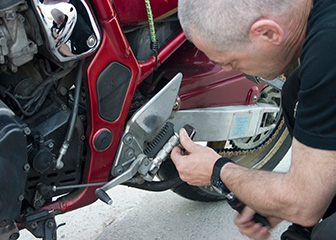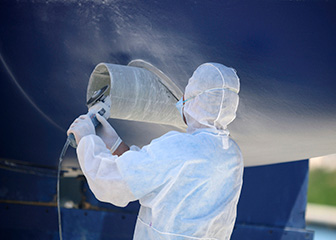Small Engine Mechanic
Small Engine Mechanic
Does this career fit your work personality?
Begin The Career Assessment Test- Best Fitting Careers
- Work Personality Strengths
- Work Style Preferences
- and more
Job Outlook
Overall employment of small engine mechanics is projected to grow 3 percent from 2022 to 2032, about as fast as the average for all occupations.
About 9,000 openings for small engine mechanics are projected each year, on average, over the decade. Many of those openings are expected to result from the need to replace workers who transfer to different occupations or exit the labor force, such as to retire.
What Small Engine Mechanics Do
Small engine mechanics inspect, service, and repair motorized power equipment. Mechanics often specialize in one type of equipment, such as motorcycles, motorboats, or outdoor power equipment.
Duties
Small engine mechanics typically do the following:
- Discuss equipment issues, maintenance plans, and work performed with customers
- Perform routine engine maintenance, such as lubricating parts and replacing spark plugs
- Test and inspect engines for malfunctioning parts
- Adjust components according to specifications
- Repair or replace worn, defective, or broken parts
- Reassemble and reinstall components and engines following repairs
- Keep records of inspections, test results, work performed, and parts used
Small engine mechanics work on power equipment ranging from snowmobiles to chain saws. When equipment breaks down, mechanics use many strategies to diagnose the source and extent of the problem. Small engine mechanics identify mechanical, electrical, and fuel system problems and make necessary repairs.
Mechanics’ tasks vary in complexity and difficulty. Maintenance inspections and repairs, for example, involve minor adjustments or the replacement of a single part. Hand calibration, piston calibration, and spark plug replacement, however, may require taking an engine apart completely. Some mechanics use computerized equipment to tune racing motorcycles and motorboats.
Mechanics use a variety of hand tools, including screwdrivers, wrenches, and pliers, for many common tasks. Some mechanics also may use compression gauges, ammeters, and voltmeters to test engine performance. For more complicated procedures, they commonly use pneumatic tools, which are powered by compressed air, or diagnostic equipment.
Although employers usually provide the more expensive tools and testing equipment, some mechanics may be required to use their own hand tools. Some mechanics have thousands of dollars invested in their tool collections.
The following are examples of types of small engine mechanics:
Motorboat mechanics and service technicians maintain and repair the mechanical and electrical components of boat engines. Most of their work, whether on small outboard engines or large diesel-powered inboard motors, is performed at docks and marinas where the repair shop is located. Motorboat mechanics also may work on propellers, steering mechanisms, marine plumbing, and other boat equipment.
Motorcycle mechanics specialize in working on motorcycles, scooters, mopeds, dirt bikes, and all-terrain vehicles. They service engines, transmissions, brakes, and ignition systems and make minor body repairs, among other tasks. Most work for dealerships, servicing and repairing specific makes and models.
Outdoor power equipment and other small engine mechanics service and repair outdoor power equipment, such as lawnmowers, edge trimmers, garden tractors, and portable generators. Some mechanics may work on snowblowers and snowmobiles, but this work is highly seasonal and regional.
Technicians and mechanics who work primarily on automobiles are described in the profile on automotive service technicians and mechanics.
Technicians who work primarily on large trucks and buses are described in the profile on diesel service technicians and mechanics.
Technicians and mechanics who work primarily on farm equipment, construction vehicles, and rail cars are described in the profile on heavy vehicle and mobile equipment service technicians.

Work Environment

Small engine mechanics held about 88,000 jobs in 2022. Employment in the detailed occupations that make up small engine mechanics was distributed as follows:
| Outdoor power equipment and other small engine mechanics | 41,600 |
| Motorboat mechanics and service technicians | 29,300 |
| Motorcycle mechanics | 17,100 |
The largest employers of small engine mechanics were as follows:
| Other motor vehicle dealers | 27% |
| Building material and garden equipment and supplies dealers | 14 |
| Self-employed workers | 13 |
| Repair and maintenance | 12 |
| Amusement, gambling, and recreation industries | 10 |
Small engine mechanics generally work in well-ventilated but noisy repair shops. They sometimes make onsite repair calls, which may require working in poor weather conditions. When repairing onboard engines, motorboat mechanics may work in cramped and uncomfortable positions.
Work Schedules
Most small engine mechanics work full time, although seasonal workers often see their work hours fluctuate.
Most mechanics are busiest during the spring and summer, when demand for work on equipment from lawnmowers to motorboats is the highest. During the peak seasons, some mechanics work many overtime hours. In contrast, some may work only part time during the winter, when demand for small engine work is lowest.
Many employers try to keep work more consistent by scheduling major repair work, such as rebuilding engines, during the off-season.
Getting Started
How to Become a Small Engine Mechanic

Small engine mechanics typically enter the occupation with a high school diploma or postsecondary nondegree award and learn their trade through on-the-job training.
Education
Motorboat and outdoor power equipment mechanics typically begin work with a high school diploma and learn on the job, although some of them seek postsecondary education. High school or vocational school courses in small engine repair and automobile mechanics are often beneficial.
Motorcycle mechanics typically complete postsecondary education programs in motorcycle repair, and employers prefer to hire these workers because they usually require less on-the-job training.
Training
Trainees work closely with experienced mechanics while learning basic tasks, such as replacing spark plugs or disassembling engine components. As they gain experience, trainees move on to more difficult tasks, such as advanced computerized diagnosis and engine overhauls. Achieving competency may take anywhere from several months to 3 years, depending on a mechanic’s specialization and ability.
Because of the increased complexity of boat and motorcycle engines, motorcycle and motorboat mechanics who do not complete postsecondary education often need more on-the-job training than that needed by outdoor power equipment mechanics.
Employers frequently send mechanics to training courses run by motorcycle, motorboat, and outdoor power equipment manufacturers and dealers. These courses teach mechanics the most up-to-date technology and techniques. Often, such courses are a prerequisite to performing warranty and manufacturer-specific work.
Licenses, Certifications, and Registrations
Many motorboat and motorcycle manufacturers offer certification specific to their own models, and certification from the Equipment & Engine Training Council is the recognized industry credential for outdoor power equipment mechanics. Although not required, certification can demonstrate a mechanic’s competence and usually brings higher pay.
Motorcycle mechanics usually need a driver’s license with a motorcycle endorsement.
Contacts for More Information
For more information on outdoor power equipment and other small engine mechanics and training programs, visit
Equipment & Engine Training Council
To learn about job opportunities for small engine mechanics, contact local motorcycle, motorboat, and lawn and garden equipment dealers; boatyards; and marinas. Local offices of the state employment service also may have information about employment and training opportunities.
Similar Occupations
This table shows a list of occupations with job duties that are similar to those of small engine mechanics.
| Occupation | Job Duties | Entry-Level Education | Median Annual Pay, May 2022 | |
|---|---|---|---|---|

|
Automotive Service Technicians and Mechanics |
Automotive service technicians and mechanics inspect, maintain, and repair cars and light trucks. |
Postsecondary nondegree award | $46,970 |

|
Diesel Service Technicians and Mechanics |
Diesel service technicians and mechanics inspect, repair, and overhaul buses, trucks, or any vehicle with a diesel engine. |
High school diploma or equivalent | $54,360 |

|
Heavy Vehicle and Mobile Equipment Service Technicians |
Heavy vehicle and mobile equipment service technicians inspect, maintain, and repair vehicles and machinery used in construction, farming, and other industries. |
High school diploma or equivalent | $58,350 |
